- ComMEATted Dissemination -
Wokshops / Conferences, Seminars
Proteins at the Heart of Contemporary Issues - Exploring Tomorrow's Food Proposals, 29 October 2024
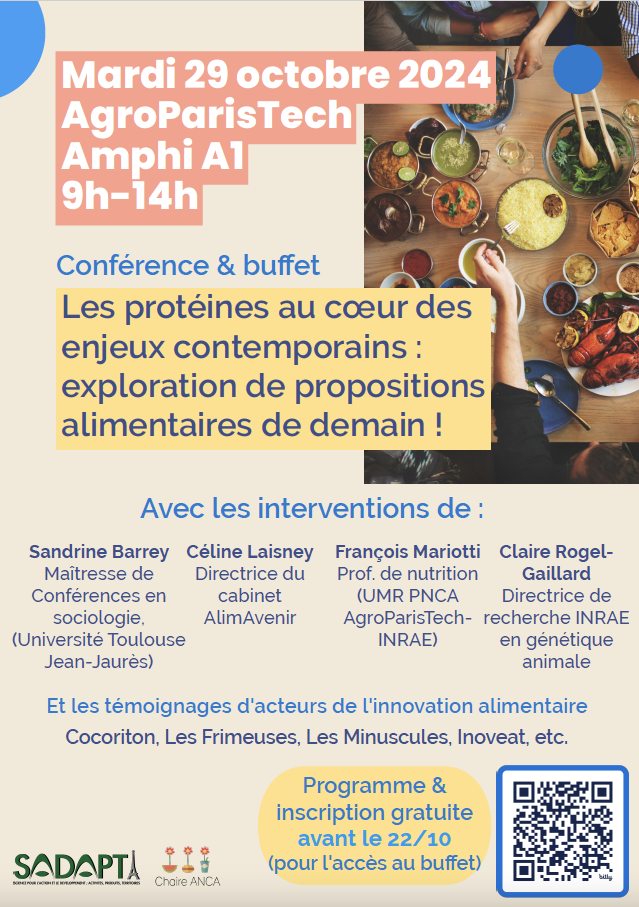
Program…
With:
- Claire Rogel-Gaillard, Research Director in Animal Genetics, INRAE
- François Mariotti, Professor of Nutrition, AgroParisTech, UMR Physiology of Nutrition and Eating Behavior (AgroParisTech-INRAE-University Paris-Saclay)
- Céline Laisney, Director, AlimAvenir Foresight and Market Intelligence Firm
- Sandrine Barrey, Associate Professor of Sociology, University of Toulouse Jean-Jaurès, Interdisciplinary Laboratory of Solidarities, Societies, Territories (LISST)
Testimonies from innovators in the food sector: Kedelai, Cocoriton, Inovea, Les Minuscules, Les Frimeuses, etc.
Controversies Surrounding Meat Substitutes: Presentation of the ANR ComMEATed Program (April 2024-2026), Methodology, and Initial Results for France
Sandrine Barrey, Toulouse Le Mirail University
"REPLAY"
Summary: Meat substitutes are already available on the European market or are under development (plant-based substitutes, insects, cultured meat). They are presented as alternative products, characterized by a "promise of difference" (Le Velly, 2017), addressing the expectations and concerns of eaters-consumers-citizens for healthier and more sustainable food. The combined goals of improving public health, food security, and transitioning to more sustainable food systems represent a major challenge for European economies (FAO & WHO, 2022; OECD & FAO, 2022; European Commission, 2020), with changes in meat production systems seen as a key lever (IPCC, 2019; UN, 2019; Średnicka-Tober et al., 2016).
This presentation first outlines the objectives of the "ComMeated" research program (ANR 2024-2026), which has just begun. This project explores the transformations of European food systems, focusing on the controversial markets of meat substitutes (plant-based, insects, and "in vitro meat"). However, these markets face significant technical, economic, ethical, legal, environmental, and cultural resistances.
In the second part, we will present our sociological inquiry into the debates and controversies raised by the commercialization of these products, as well as the mixed methodology used to address them, combining online ethnography, interviews, European comparison, and textometric analysis. The goal is to understand the collective perception of these products by examining the arguments and positions of stakeholders within the context of national and European debates. The research aims to shed light on the arguments that could influence consumer practices and perceptions.
Finally, we will present some preliminary exploratory results on the French controversy, particularly the differing views on livestock farming, the objectives pursued by various actors, the resistances they face, and the possible futures opened up by this controversy.
More info…
///
Seminar - Controversies Surrounding Meat Substitutes in Europe: Presentation of the ANR ComMEATed Program, 4 October 2024
[CERTOP/SANTAL-LISST SEMINAR]
Methodology, and Initial Results for France - With the participation of Sandrine Barrey, Mathieu Aristegui, Enola Comte, and Julien Figeac
Presentation of the ANR ComMEATed program at the LISST and CERTOP cross-disciplinary health seminar (Université Toulouse Jean-Jaurès), as well as the methodology and initial results of WP2 France.
This generated a lot of interest.
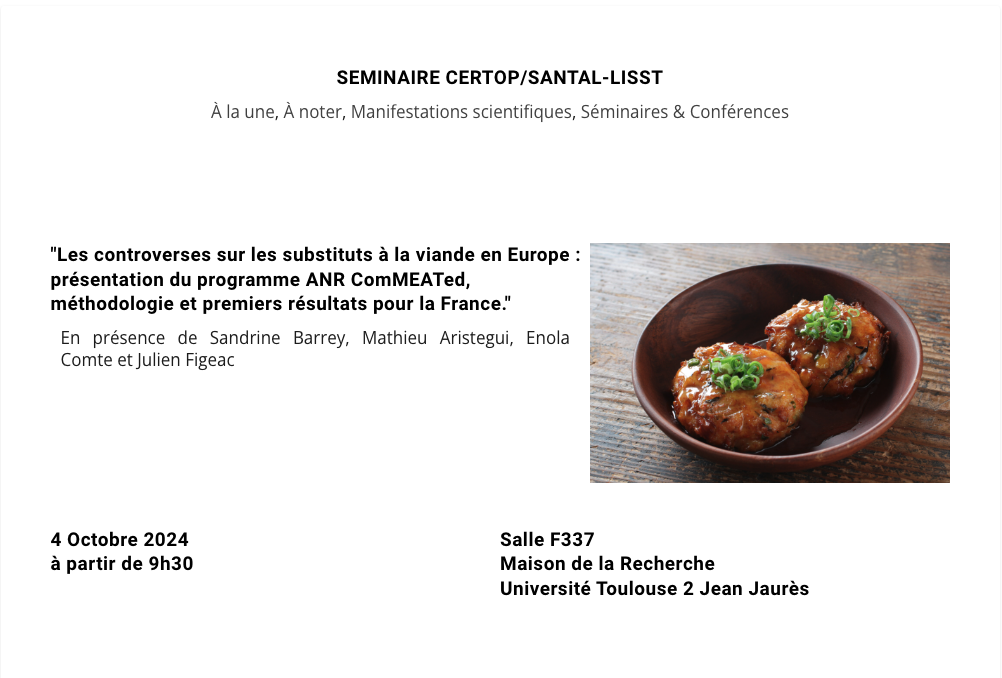
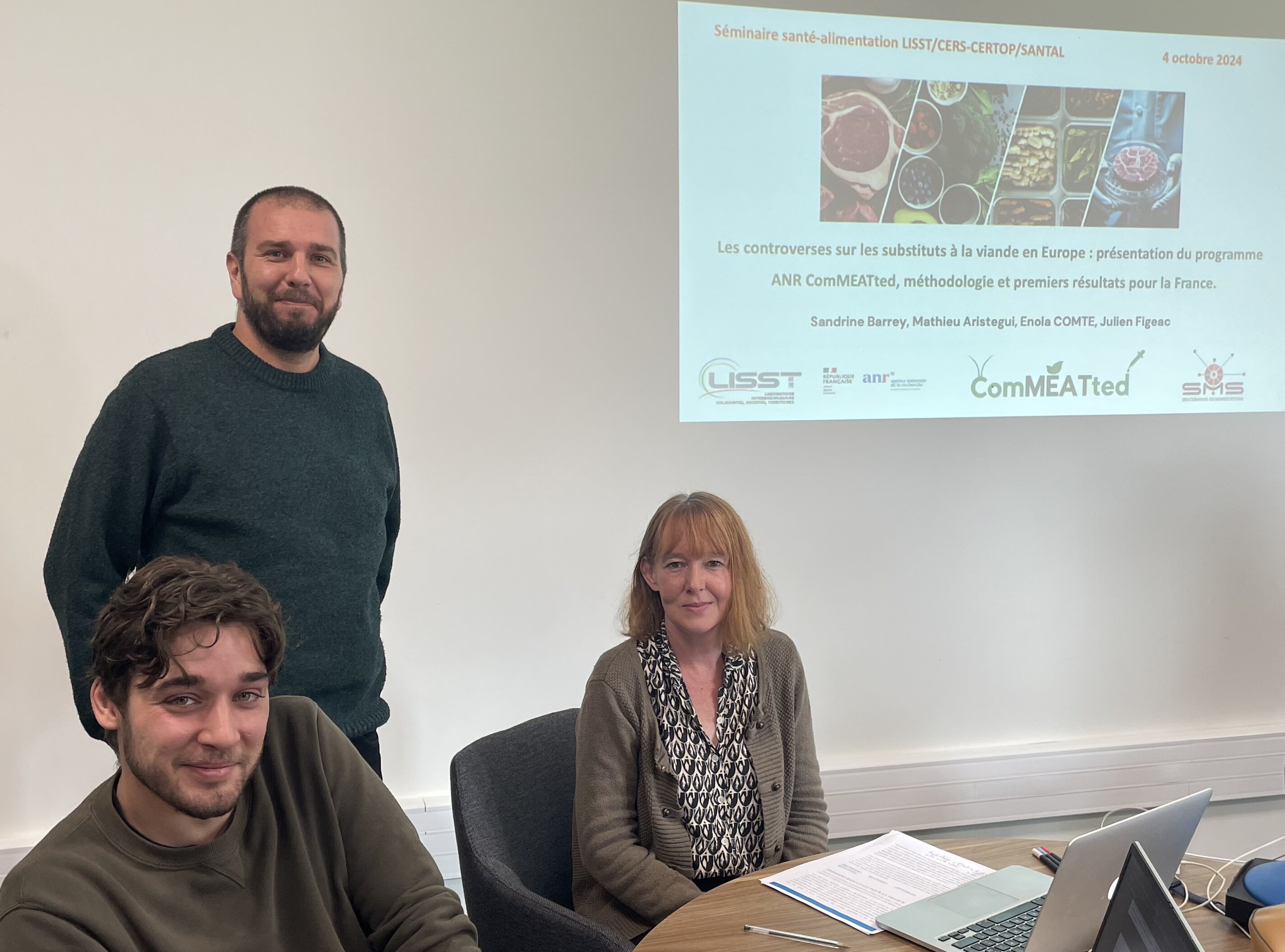
Photo from left to right: Mathieu Aristegui, Julien Figeac, Sandrine Barrey ///
Association for Consumer Research (ACR) conference, Paris, 26-29 September 2024
28 September 2024 - 08:20 - "Why We Think Unhealthy Food Tastes Better: From Cognitive Illusions to Unfavorable Beliefs About Food"
Sonja Kunz; Niklas Pivecka; Arnd Florack
///
TDGPs/ÖGP Congress 2024 Vienna, Austria, 16-19 September 2024
17th September 2024 - Symposia: Health Psychology: The Influence of Nutrition (DE,EN); Nutrition
09:45 - "Seeing is Misbelieving: Consumers Wrongly Believe That Unhealthy Food Tastes Better When There is More of it"
Sonja Kunz; Niklas Pivecka; Clara Dietachmair; Arnd Florack
Many people believe that unhealthy food tastes better than healthy food, even though tasty healthy foods exist. Our studies suggest that this belief arises from seeing many unhealthy foods without realizing that taste and healthiness are unrelated. We found that when people are exposed to more unhealthy food, they are likely to think unhealthy food tastes better. This pattern persists, because our food environments are also full of tasty foods. If people are more likely to try unhealthy food in such mostly tasty environments, their beliefs are reinforced. Making healthy foods more available and encouraging people to try them may help shift these perceptions.
///European Society for Agricultural and Food Ethics in NL, 11-14 September 2024
Thursday 12 September 2024 - SESSION 1.2 More-than-human food systems Session
Conference - Efstathiou, S., “The eat-er and the fed-er: feeling, feeding and livestock in more-than-animal worlds”
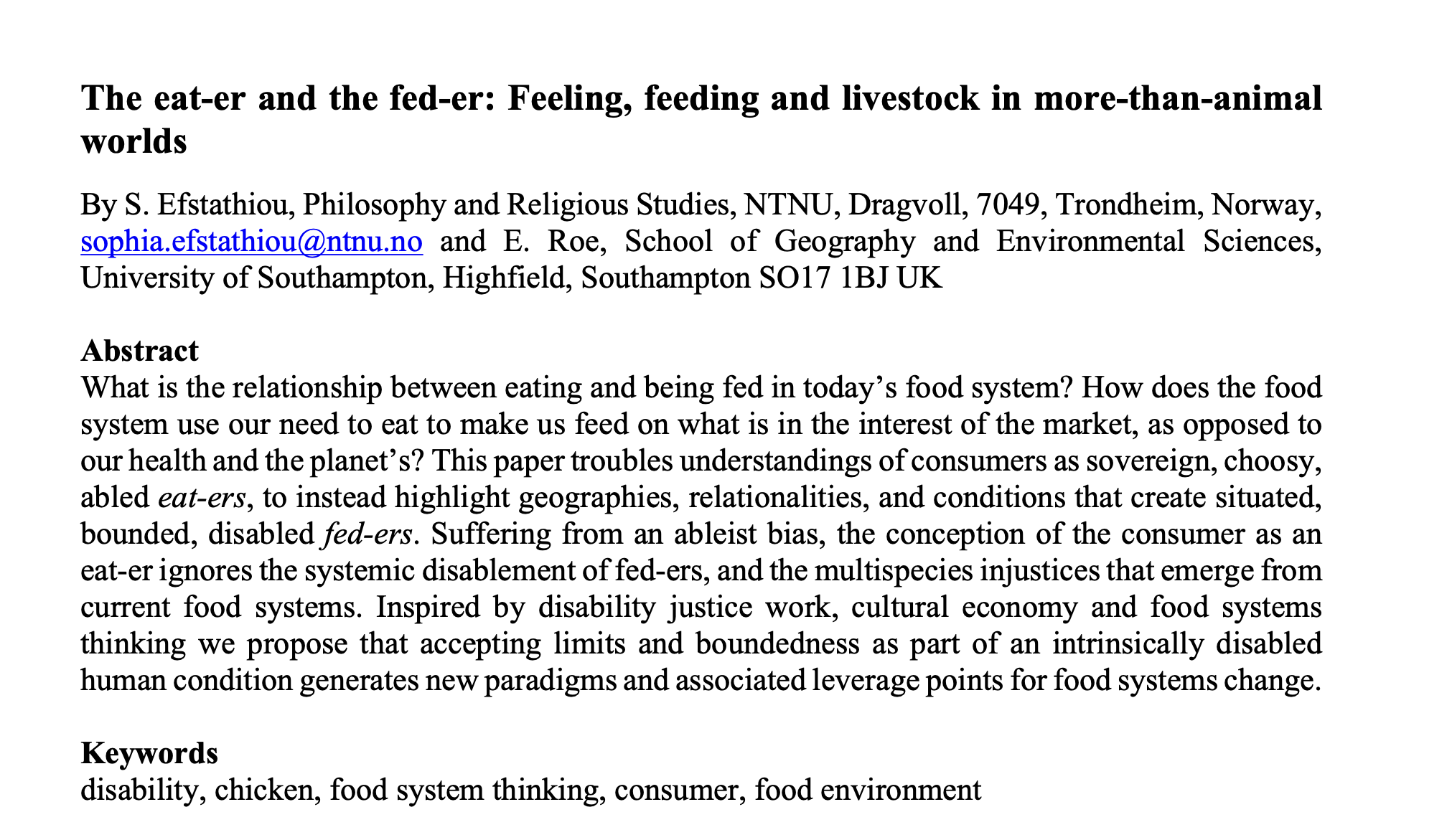
--- --- --- --- ---
Scientific publications
Hémar-Nicolas V., Thomas F., Gallen C., Pantin-Sohier G. (2024), Realistic or not? The impact of packaging images on the acceptance of insect-based food products, Journal of Product and Brand Management, Juin 2024.
Wider Audience
--- --- --- --- ---

Alors qu’il est désormais autorisé de vendre de la viande cultivée en laboratoire aux États-Unis et à Singapour, en Europe, ce nouvel aliment divise. Si certains pays misent sur son développement, l’Italie a voté une loi l’interdisant. L’Union européenne n’a pas encore statué sur l’absence totale de risque pour le consommateur, mais cela n’empêche pas de voir fleurir les investissements publics ou privés.
https://theconversation.com/la-viande-cultivee-en-laboratoire-pourrait-elle-se-developper-en-europe-250084
Abstract: The marketing of lab-grown meat is now permitted in the United States and Singapore, but it remains a divisive issue in Europe. While some countries are focusing on its development, Italy has passed a law banning it. The European Union has yet to take a position on the full consumer safety of lab-grown meat, although both public and private investment continues to grow. In view of concerns about meat consumption, this emerging food source has received considerable attention in current agri-food policy. However, its transparency, nutritional implications, carbon footprint, and environmental and animal welfare impacts remain key points of debate, particularly in Europe. This article provides an overview of the different positions and developments regarding lab-grown meat on the continent.
--- --- --- --- ---
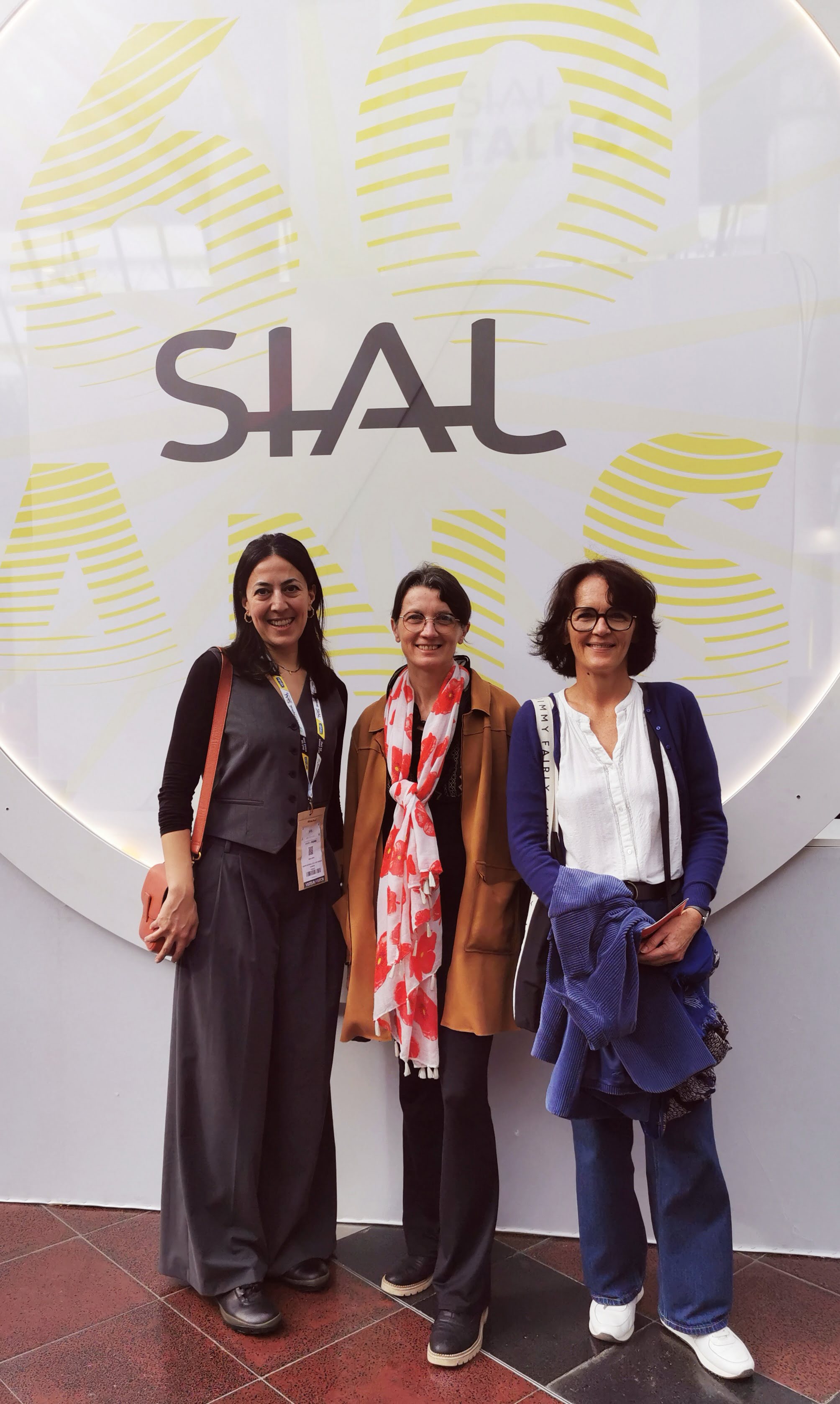
ComMEATted Researchers Engage with Future Food Trends at SIAL 2024
The ComMEATted project team took part in SIAL, a key event for exploring the trends and challenges of tomorrow's food systems. Our researchers engaged in discussions on food innovations and meat alternatives, contributing to an interdisciplinary reflection on future food transitions.
https://www.sialparis.com/en
--- --- --- --- ---
Meat Replacers in ROMANIA: Preliminary Findings in a Nutshell
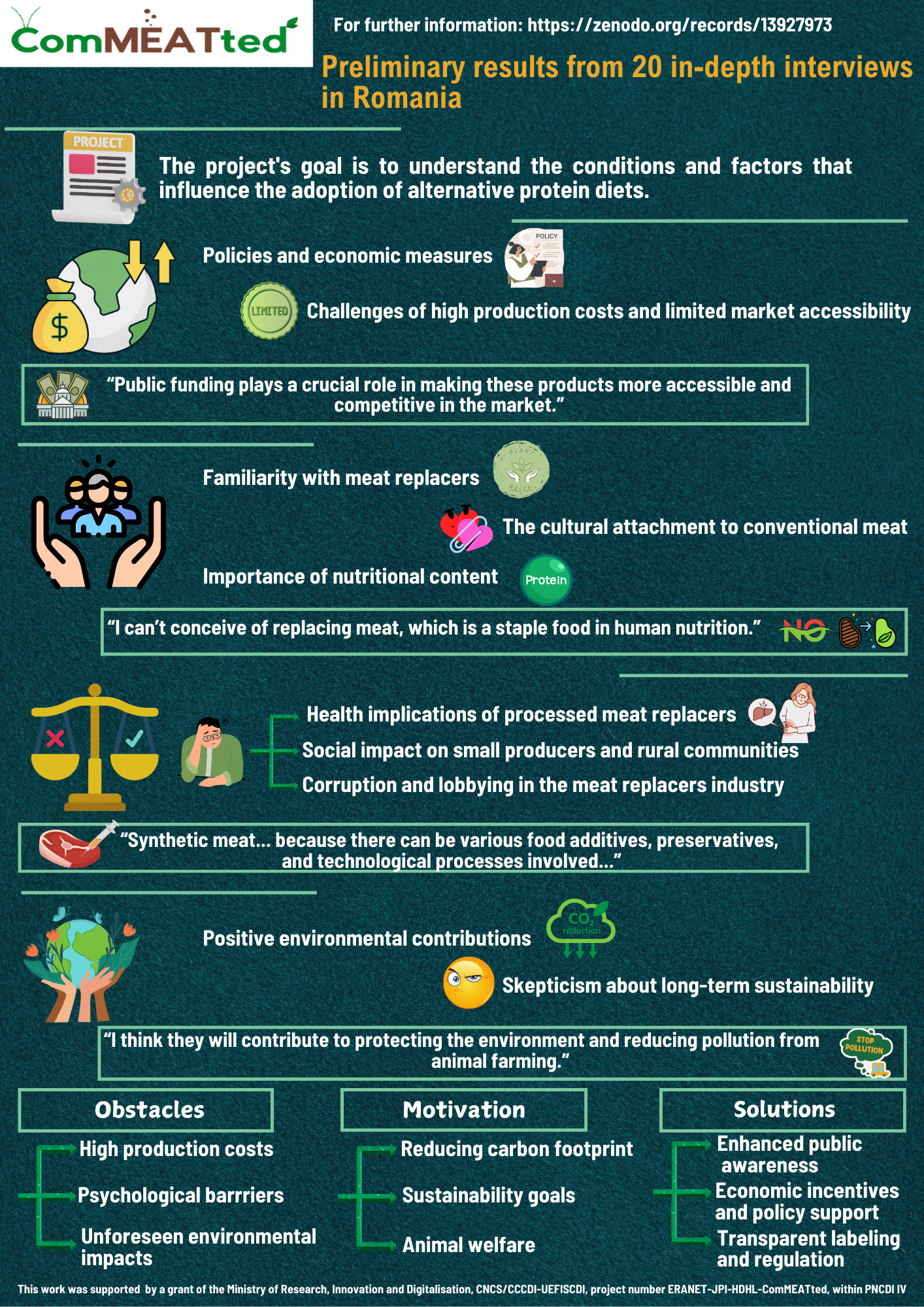
The preliminary findings are drawn from qualitative data collected through interviews conducted in Romania, exploring perceptions, attitudes, and behaviors about meat replacement products. This data collection is part of the larger project, “Committed to the Responsible Development of Meat Replacement Products and Practices: Comparing Multidimensional Barriers and Potentials in European Countries” (ComMEATted), under the JPI HDHL “FOODRETEC” initiative.
https://zenodo.org/records/13927973
--- --- --- --- ---
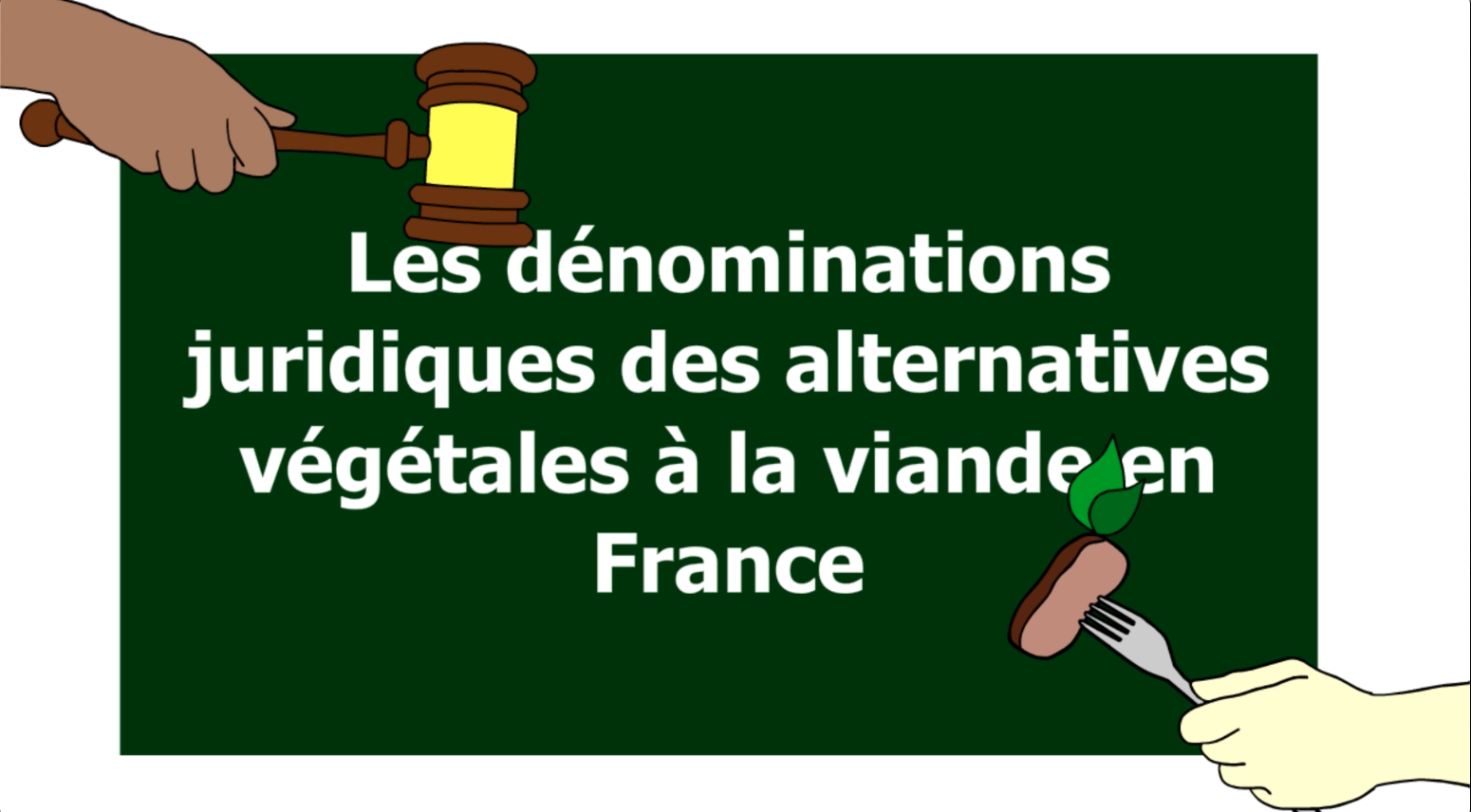 Les dénominations juridiques des Alternatives végétales à la viande en France
Les dénominations juridiques des Alternatives végétales à la viande en France (The legal terms for plant-based alternatives to meat in France)
ComMEATted Project: The issue of naming alternatives to meat in a short video
Réalisation/Realization: Valentine Allard
Juillet 2024/July 2024




